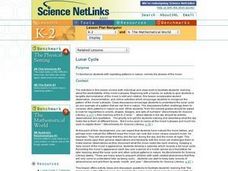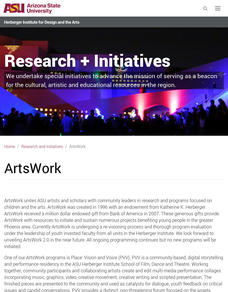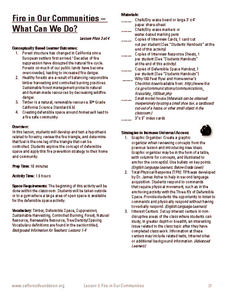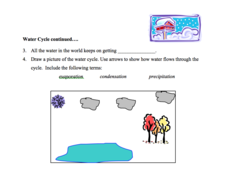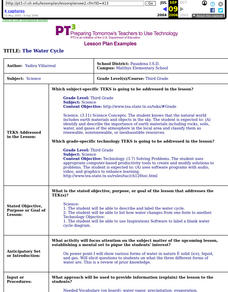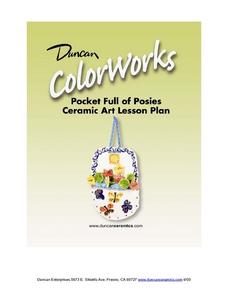Curated OER
Carbon Cycles
Students examine the carbon cycle and how carbon atoms travel through it. In this energy cycles lesson plan students describe how human activities affect the carbon cycle.
Carnegie Mellon University
Introduction to Climate
Begin a full lesson on climate change by demonstrating how carbon dioxide gas contributes to increased temperatures. Be aware that pressure inside the antacid-containing bottle in Activity 2 may cause the lid to fly off; keep viewers at...
Science 4 Inquiry
Carbon and Climate
The carbon cycle is natural and has happened for millions of years, so can humans change it? Young scientists play the role of carbon as they travel through the carbon cycle. They complete two rounds, once before the industrial...
Curated OER
Lunar Cycle
Students recognize that the eight phases of the moon repeat. For this lunar cycle lesson, students experiment to understand the phases of the moon. Students make observations and complete a "the Moon I See" worksheet. Students record on...
Curated OER
Lunar Cycle
Pupils become familiar with repeating patterns in nature, namely the phases of the moon.
Curated OER
Water
Third graders study different bodies of water and how they fit into the water cycle. They explain that materials exist in different states (solid, liquid and gas) and change from one to another, that there are systems, order, and...
Curated OER
Review of Life Cycle
Learners illustrate the life cycle of a butterfly. In this life cycle instructional activity, students use the book From Caterpillar to Butterfly and the Internet to learn about life cycles. Learners use different types of pasta to...
Forest Foundation
Fire in Our Communities - What Can We Do?
Learn about defensible space and renewable resources with a activity about forest fires. After exploring the ways that humans have impacted the environment, kids conduct mock interviews about differing points of view in the conservation...
Core Knowledge Foundation
Rocks & Minerals
Take young geologists on an exploration of the rock cycle with this six-lesson earth science unit on rocks and minerals. Through a series of discussions, demonstrations, and hands-on investigations your class will learn about the...
Discovery Education
Motion in the Ocean
How do temperature changes affect ocean currents? Scholars explore convection currents by demonstrating the flow of water in a baking dish. They use ice, heat, and food coloring to see currents. Then, they draw conclusions about their...
Curated OER
Water, Water Everywhere!
Learners brainstorm on ways they use water, and where water comes from. They view video, Down the Drain, to gain specific facts about water use, properties of water, problems of water and the water cycle. They perform a lab activity...
Curated OER
Running an Elementary Book Club
Combine reading with fun in order to create lifelong, literary-minded learners who love to read.
Curated OER
The Water Cycle--Using Inspiration Software
Third graders describe and label the water cycle, and list how water changes from one form to another; students use Inspiration Software to label a blank water cycle diagram.
Curated OER
How Does Your Garden Grow? Discovering How Weather Patterns Affect Natural Cycles
For the warm-up in this cool climate lesson, you will need to click on "Mapping" and then "US Mapping" once you arrive at NOAA's "US Climate at a Glance" page. Earth science explorers realize that 2012 was a warm winter for us. They read...
Discovery Education
Smoke on the Water
How do clouds form? Learners demonstrate the formation of clouds and the water cycle by testing four different setups in a plastic bottle. They identify the key components of a cloud to help them understand the process of cloud...
Curated OER
Pocket Full of Posies: Ceramics
After studying the plant or flower life cycle, have the class create a basket of flowers out of clay. They hone their ceramics skills while they push, pull, then paint clay to look like flowers they've seen in nature. There are several...
Curated OER
Hazards: Fourth Grade Lesson Plans and Activities
Learn about damage associated with earthquakes and materials that best withstand a quake. A lab engages class members in the experimental design and construction of sturdy structures that can endure various earthquake intensities. Groups...
Curated OER
Hazards: Fifth Grade Lesson Plans and Activities
After comparing earthquake and volcanic hazards to one another, fifth graders take a closer look at damage associated with a volcanic eruption. They then create a simulation of mudslides due to a volcanic eruption. Using different...
Curated OER
Water Cycle and Its Movement in the Soil
Students are introduced to the water cycle and water movement in soil. In this water cycle instructional activity, students explore how water moves through the water cycle and discuss water sources, natural reservoirs, soil infiltration...
Curated OER
'O'opu Life Cycle
Students investigate the life cycle of the 'o'opu also known as Hawaiian gobies. For this amphidromous living lesson, students discuss the reproductive cycle, create props and an obstacle course to demonstrate the importance of the...
Curated OER
How Trees Contribute to the Water Cycle
In this water cycle instructional activity, 3rd graders conduct an experiment where they observe and calculate how water transpires in different types of trees. Students engage in a class discussion and use Venn Diagrams to compare...
Curated OER
A Model of the Rock Cycle
For this rock cycle worksheet, students use different colored crayons to represent different types of rocks. They follow step by step procedures to model the rock cycle with the crayons. Students draw the rock cycle, show weathering,...
Curated OER
The Other Water Cycle
Students examine human impacts on the water cycle. They compare/contrast the permeability of various materials for the purpose of engineering landscape drainage systems, and answer discussion questions.
Curated OER
Water Cycle
Ninth graders explore ways water moves through various reservoirs on Earth, examine how human activities change water cycle, investigate substances present in water that indicate human activity, and discuss how understanding water cycle...






